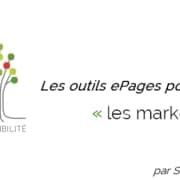Google’s mobile-first indexation: What merchants should know
Google has already announced several times that they will switch their index to “mobile-first” or even “mobile-only”. This means that only content that is easily visible on mobile devices will be indexed, i.e. be prioritised in the search results. The background to this is that more than half of all search queries now come from mobile devices, predominantly smartphones.
A classic desktop view cannot be displayed well on smartphones and would therefore appear far down in the index or not at all. As a result, websites may not only lose visitors using smartphones, but possibly desktop users as well. This change by Google could come into effect as early as April 2021. In this article, we explain how Google proceeds with indexing and why merchants are best prepared for that switch with ePages Now.
How does Google index its content?
A so-called “crawler” constantly searches the entire internet for content and evaluates its relevance for the search in order to always show users the most relevant results. The prerequisite is that Google should know your site. Therefore, it is important that your website is registered with Google or be linked to from other, already known pages. If that’s not currently the case, site has less visibility to Google. Therefore, your content and products are less likely to be displayed in the top search results.
When you search for something on Google, you are usually shown a large number of hits from the index. In practice, however, customers almost exclusively click on hits that are shown to them on the first page because they trust the quality of Google’s results. This so-called ranking is always a dynamic and an individualised process. Not only the content itself, but also the structure of the page, the loading speed, typical dwell time, frequency of clicks, spam hints, quality of images and many other factors play a role in the ranking. The display on smartphones is also an important criterion because Google does not want to send its users to pages that are difficult to navigate.
Why is “mobile-first” so important?
You are probably familiar with your own website from editing it via desktop. But already a majority of search queries are made via mobile devices such as smartphones, and according to a study by Smart Insights, the numbers continue to grow. That’s why Google has been preparing to move to the mobile-first index to deliver a better user experience to Google users. From April 2021, “mobile-first” is expected to apply to all websites. You can see whether Google has already activated the mobile-first index for your website in the Google Search Console. Then the algorithm will only rank content that is optimised for mobile devices.
Responsive Web Design as an all-in-one solution
In order to continue to achieve an ideal ranking, Google recommends switching to a Responsive Web Design. What does this mean? A website with Responsive Web Design reacts automatically to the end device. Thus, all content elements of the website are always displayed in the appropriate size:

The responsive web design of ePages Now
Now Shops are well prepared for the switch to mobile-first
Your Now shop is already responsive, so it is optimally displayed on mobile devices as well as desktops. A big advantage is that all content is clearly visible in every view and optimised for the respective device in terms of navigation.
ePages Base shops also have a mobile view that you can activate. However, this does not automatically make them responsive and this may possibly lead to a lower ranking in the future. In order to enable merchants to prepare for Google’s mobile-first index, we offer all Base customers a free update to the shop version Now. Merchants who only use features in the Base shop which are also available in Now will already be informed about this possibility in the administration area of their shop. Merchants that currently use features that are not yet available in Now can also request the update from their shop provider. A tool is available for the update that automatically transfers the content of the shop and almost all inventory data. You can find more information about the update to the shop version Now on our info page.
Als Content Manager bei ePages ist Sarah für redaktionelle Inhalte und Videocontent zuständig. Im ePages-Blogstellt sie Onlinehändlern Marketingtipps, rechtliche Updates und Infos zur ePages-Software zur Verfügung, um ihnen den Einstieg in den E-Commerce zu erleichtern.





Leave a Reply
Want to join the discussion?Feel free to contribute!